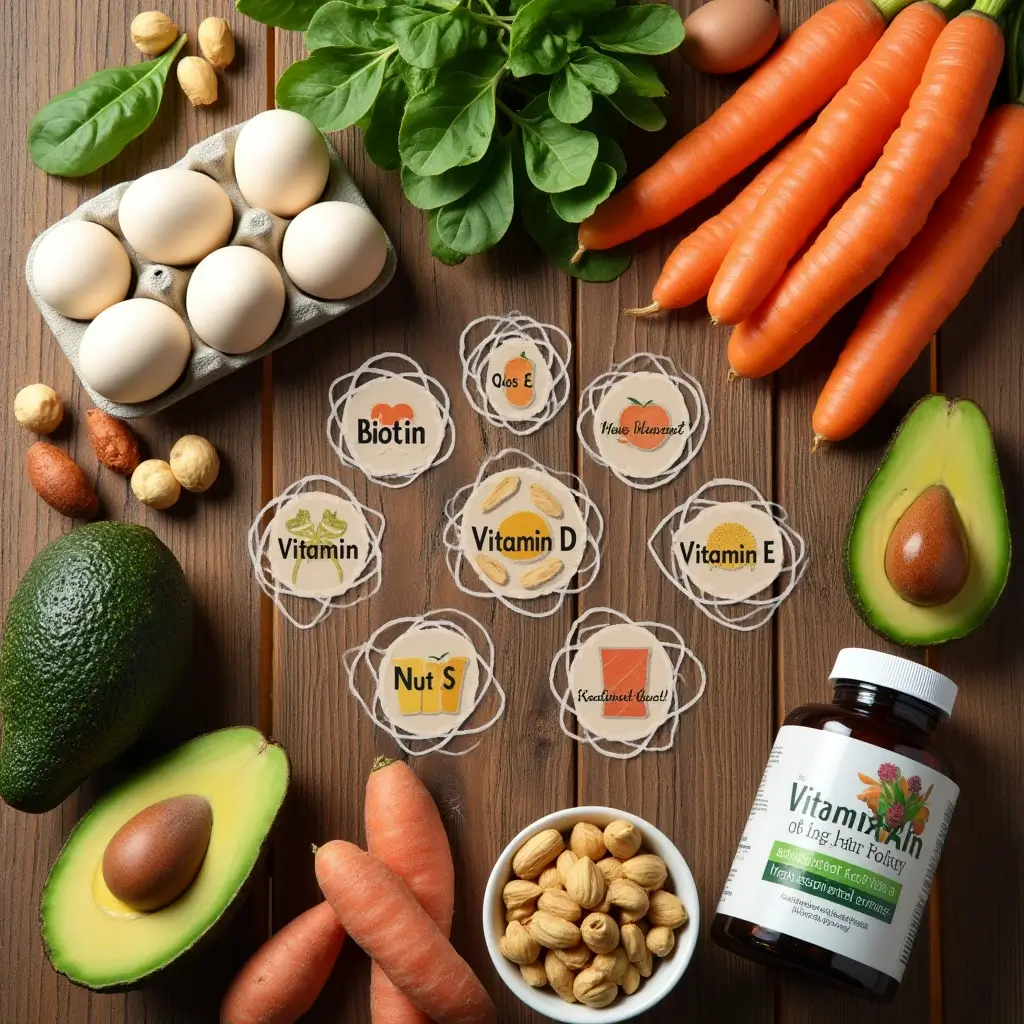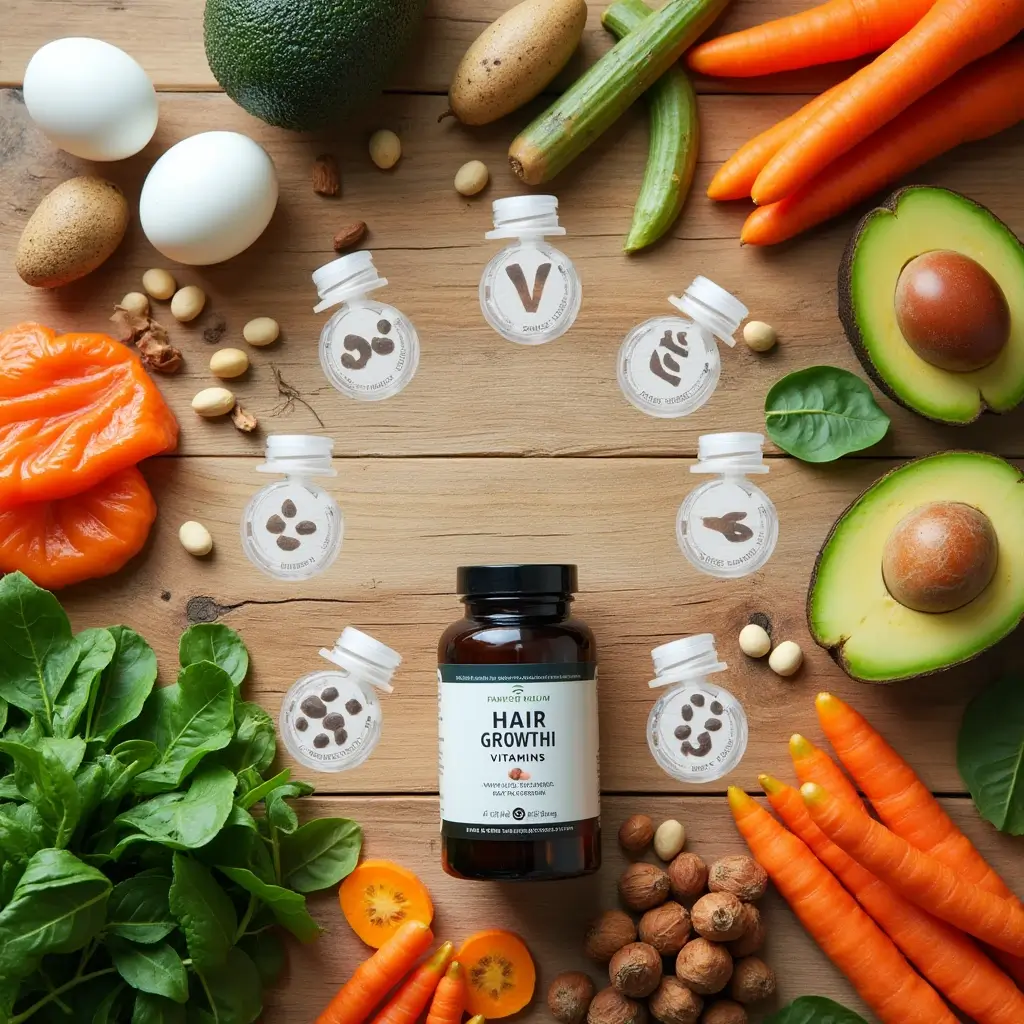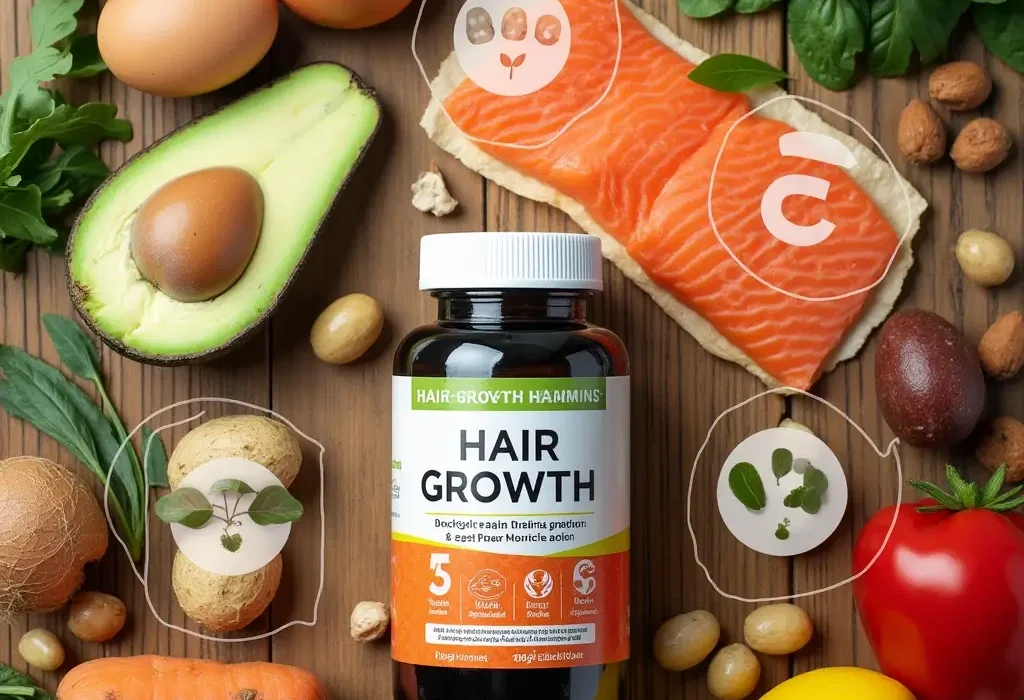We all want strong, beautiful hair, but sometimes, despite our best efforts, it seems like it just won’t grow the way we want. Whether your hair is thinning, breaking, or simply not growing fast enough, you’re not alone in this struggle. The good news? Your hair’s health is deeply connected to the nutrients you put in your body. By understanding which vitamins are essential for hair growth, you can start nourishing your hair from the inside out, and see a significant improvement in its health, strength, and thickness.
In this guide, we will explore the best vitamins for hair growth, detailing how they work, why they are crucial, and how to incorporate them into your daily routine. Whether you are battling hair loss or simply want to enhance the health of your hair, these vitamins can help you achieve your hair goals.
Understanding Hair Growth and Nutrition
Hair growth is a complex process that’s influenced by many factors—genetics, age, hormones, and yes, nutrition. Just like your skin or any other part of your body, your hair needs proper nourishment to grow and thrive. If your body lacks the vitamins and minerals it needs, hair growth can slow down, and thinning or hair loss can occur.
Vitamins play an essential role in supporting your hair follicles, promoting blood circulation to the scalp, and encouraging healthy hair growth. Without the right nutrients, your hair can become dry, brittle, and prone to breakage.
It’s important to note that while vitamins are vital for hair health, they work best when combined with other healthy lifestyle practices, such as managing stress, avoiding excessive heat or chemical treatments, and maintaining a healthy diet. But today, let’s focus on the vitamins that can make all the difference.
The Role of Vitamins in Hair Growth
Before we dive into the best vitamins for hair growth, it’s crucial to understand why vitamins are so important in the first place. Vitamins are organic compounds that your body needs to function correctly. They’re responsible for several processes, including cell repair and regeneration, which directly impacts hair growth.
Some vitamins stimulate hair follicles, while others nourish your scalp, and some even help reduce hair loss caused by nutrient deficiencies or hormonal changes. For the best results, it’s important to ensure that your body is getting a well-rounded mix of vitamins, minerals, and other essential nutrients.
The Best Vitamins for Hair Growth

When it comes to promoting hair growth, certain vitamins stand out as particularly important. Let’s break down the best vitamins for hair growth, how they work, and where you can find them.
1. Biotin: The Hair Growth Superstar
Biotin, also known as Vitamin B7, is perhaps the most well-known vitamin for promoting hair growth. This water-soluble vitamin is essential for the production of keratin, a protein that makes up the majority of your hair, skin, and nails. Biotin works by strengthening the hair follicles and supporting the production of keratin, which can lead to longer, thicker, and healthier hair.
Why It’s Great for Hair Growth:
- Biotin helps your body metabolize carbohydrates, fats, and amino acids, which is essential for overall cell growth, including the cells that produce hair.
- It improves scalp health by ensuring that the follicles are receiving the nutrients they need to produce healthy hair.
- Studies have shown that biotin supplementation can improve hair thickness and reduce hair shedding in people with biotin deficiency.
Natural Sources of Biotin:
- Eggs
- Nuts and seeds (such as almonds and sunflower seeds)
- Oats
- Dairy products (milk, yogurt, cheese)
- Sweet potatoes
2. Vitamin D: Essential for Hair Follicle Health
Vitamin D is often linked to bone health, but did you know it also plays a crucial role in hair health? It’s involved in the growth and maintenance of hair follicles, which are tiny pores in your scalp where hair grows from. Low levels of Vitamin D have been linked to hair loss, particularly in conditions like alopecia areata, an autoimmune disorder that causes hair loss.
Why It’s Great for Hair Growth:
- Vitamin D helps to activate hair follicles, promoting the growth of new hair strands.
- It also regulates the hair growth cycle, ensuring that hair stays in the growth phase longer and shedding is minimized.
- Many people suffer from Vitamin D deficiency, especially those who live in areas with limited sunlight.
Natural Sources of Vitamin D:
- Fatty fish (salmon, mackerel, sardines)
- Fortified foods (such as milk, orange juice, and cereals)
- Egg yolks
- Mushrooms exposed to sunlight
3. Vitamin A: Promoting Healthy Scalp and Hair Growth
Vitamin A is a fat-soluble vitamin that is essential for cell growth and maintenance, and this includes the cells that make up your hair. It also plays a crucial role in maintaining a healthy scalp by promoting the production of sebum, a natural oil that keeps your hair moisturized and prevents dryness.
Why It’s Great for Hair Growth:
- Vitamin A helps to moisturize your scalp, preventing dandruff and dryness that could hinder hair growth.
- It supports the production of healthy cells, which are crucial for hair follicle regeneration.
- Low levels of Vitamin A can lead to dry, brittle hair, making it more prone to breakage.
Natural Sources of Vitamin A:
- Carrots
- Sweet potatoes
- Kale and spinach
- Liver
- Red bell peppers
4. Vitamin E: Antioxidant Protection for Hair
Vitamin E is a powerful antioxidant that helps protect your hair follicles from damage caused by oxidative stress, which can result from environmental pollutants, UV rays, or even poor diet. It also promotes healthy circulation to the scalp, ensuring that hair follicles receive the nutrients they need for optimal growth.
Why It’s Great for Hair Growth:
- Vitamin E helps reduce free radical damage that can weaken hair strands and slow down growth.
- It enhances blood circulation to the scalp, delivering nutrients to hair follicles more efficiently.
- Some studies suggest that Vitamin E supplementation may improve hair thickness and reduce hair loss.
Natural Sources of Vitamin E:
- Sunflower seeds
- Almonds
- Avocados
- Spinach
- Kiwi
5. Vitamin C: The Collagen Builder for Stronger Hair
Vitamin C is essential for collagen production, a protein that makes up a significant portion of your hair structure. Collagen helps to keep hair strands strong and healthy, reducing the risk of breakage. Additionally, Vitamin C helps your body absorb iron, which is another important nutrient for hair health.
Why It’s Great for Hair Growth:
- Vitamin C boosts collagen production, which strengthens hair follicles and reduces hair breakage.
- It helps in the absorption of iron, an essential mineral for promoting healthy hair growth.
- It also has antioxidant properties that protect your hair from environmental damage.
Natural Sources of Vitamin C:
- Citrus fruits (oranges, lemons, grapefruits)
- Bell peppers
- Strawberries
- Broccoli
- Kiwi
Key Minerals for Hair Growth

In addition to vitamins, minerals also play an important role in supporting hair growth. Below are a few essential minerals that help promote healthier hair.
1. Iron: Preventing Hair Thinning
Iron is essential for delivering oxygen to the hair follicles, which helps to support healthy hair growth. A deficiency in iron can lead to hair thinning or even hair loss, especially in women of reproductive age.
Natural Sources of Iron:
- Red meat (beef, lamb)
- Spinach
- Lentils
- Beans
- Tofu
2. Zinc: Supporting Hair Regrowth
Zinc is a mineral that helps regulate hormone levels, including those that affect hair growth. It also supports the production of proteins that form hair, including keratin. Zinc deficiency has been linked to hair loss and slower regrowth.
Natural Sources of Zinc:
- Meat (beef, lamb)
- Shellfish (oysters, crab)
- Nuts and seeds (pumpkin seeds, cashews)
- Whole grains
3. Magnesium: Relaxing Your Scalp for Optimal Hair Growth
Magnesium plays a role in reducing stress, which can contribute to hair loss. By keeping stress levels under control, magnesium helps to promote a healthy environment for hair growth.
Natural Sources of Magnesium:
- Leafy greens (spinach, kale)
- Bananas
- Whole grains
- Legumes (beans, lentils)
How to Incorporate These Vitamins into Your Diet
The easiest way to ensure that your body is getting the essential vitamins and minerals for hair growth is by eating a balanced, nutrient-dense diet. Here are a few simple meal ideas to help you get the right vitamins for hair health:
- Breakfast: A smoothie made with spinach, strawberries, and almond milk for Vitamin C, Vitamin A, and Vitamin E.
- Lunch: A quinoa salad topped with roasted sweet potatoes, avocado, and grilled salmon for Vitamin A, Vitamin D, and Omega-3s.
- Dinner: A hearty stir-fry with lean beef, bell peppers, and spinach, served over brown rice for Iron, Zinc, and Vitamin A.
Common Mistakes to Avoid When Taking Vitamins for Hair Growth
While vitamins are important for hair health, it’s possible to overdo it. Excessive intake of certain vitamins, like Vitamin A and Vitamin D, can lead to toxicity and cause more harm than good. Always stick to recommended dosages, and consult with a healthcare provider before starting any new supplements.
Nourish from Within for Beautiful Hair
Achieving beautiful, strong hair starts from the inside. By incorporating the best vitamins for hair growth—like Biotin, Vitamin D, Vitamin A, Vitamin E, and Vitamin C—into your daily routine, you can give your hair the nutrients it needs to grow long, strong, and healthy.
Remember that consistency is key. It may take time to see visible results, but with patience and the right nutrients, you can achieve the hair you’ve always dreamed of.
Ready to start your hair growth journey? Begin by taking small steps today—incorporate more hair-boosting vitamins into your diet, and watch your hair transform over time.
FAQs: Best Vitamins for Hair Growth
1. What’s the best vitamin for hair growth?
The best vitamins for hair growth include Biotin, Vitamin D, Vitamin E, and Vitamin A. Biotin, in particular, is widely recognized for its role in supporting hair health, while Vitamin D plays a crucial part in the hair growth cycle. Vitamin E helps improve scalp circulation, and Vitamin A promotes healthy sebum production on the scalp.
2. Do vitamins for hair growth really work?
Yes, vitamins can support healthy hair growth, especially if you’re deficient in specific nutrients. However, vitamins alone are not a miracle cure. For optimal hair health, a balanced diet, proper hair care, and other lifestyle factors like stress management are equally important. Supplements can enhance hair health if you’re missing key nutrients like biotin, iron, or Vitamin D.
3. What vitamin am I lacking if my hair is falling out?
Hair loss can be linked to deficiencies in several vitamins and minerals, including Biotin, Vitamin D, Iron, and Zinc. A blood test can help identify any deficiencies you may have. If you suspect hair loss due to nutritional gaps, consulting with a healthcare professional is recommended.
4. What to eat for hair growth?
For healthy hair growth, include foods rich in essential vitamins and minerals like:
- Biotin: Eggs, nuts, seeds
- Vitamin D: Fatty fish, fortified dairy products, mushrooms
- Iron: Red meat, spinach, lentils
- Vitamin C: Citrus fruits, peppers, broccoli
- Omega-3 fatty acids: Salmon, walnuts, flaxseeds
A nutrient-dense diet that includes these foods can help support strong, healthy hair.

